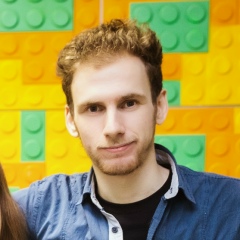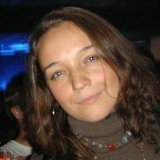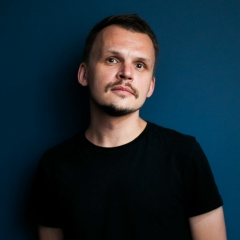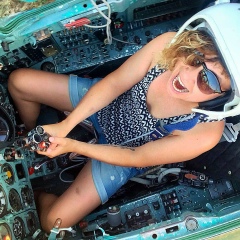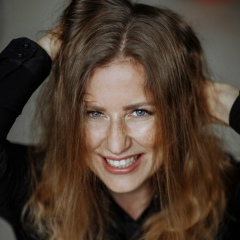Сходил на лекцию [id5695154|Коли] о том что такое "я". В каком-то смысле не узнал почти ничего нового (кроме интересной теории зарождения жизни). Но не узнал не потому что лекция не дала новых знаний (наоборот, она была вполне интересной), а потому что описанное в лекции мировосприятие и логические размышления полностью совпадают с моими. Совпадают настолько, что я сам для себя много раз повторял именно тот мысленный эксперимент, который Коля описал в самом начале (про телепорт, который работает через создание точной копии человека в другом месте, и уничтожение его в первой точке - можно ли это считать переносом человека, аналогичным обычному перемещению его физических частиц, и согласились ли бы вы воспользоваться таким телепортом).
Наше сознание, разум человека, наше "я" — это самоосознание сложного биологического механизма, это результат совокупной работы всех клеток и алгоритмов мозга (алгоритмов, которые тоже заданы физическими объектами — привет моему вопросу про информацию и функцию, в пределе эти понятия неотличимы друг от друга, но об этом как-нибудь отдельно). Грубо говоря, как если бы компьютер "осознал" себя. В этом смысле просто нет никакого "я", это понятие не имеет смысла отдельно от организма. Есть сложный организм, большой компьютер, который работает. Факт его работы и есть наше сознание. Никаких метафизических надстроек не нужно, все вполне вписывается в парадигму компьютерной программы. Приятно что вся логика развития жизни с самых первых РНК не просто подтверждает такое конструктивное мировосприятие, но и формирует саму эту модель. Когда ты строишь дом из кирпичиков, достроенный дом не обретает волшебным образом разум после установки последнего кирпичика. Просто дом построен настолько восхитительно сложно, что это одновременно и завод по производству других домов, и электростанция, и компьютер в станке, который строит другие дома на этом заводе, вся эта совокупность и есть сознание — мозг. И биология описывает ровно такую эволюцию: вот же они кирпичики, а вот дома из этих кирпичиков получились, а вот и станок с первым алгоритмом. Это ни в коем случае не уменьшает значимость личности человека, не лишает его уникальности. То что "я" - это "всего лишь" набор клеток и взаимодействий между ними, не означает что в этом нет волшебства, бесконечная последовательность вероятностных процессов, которая привела к такому сложному механизму ничем не хуже магии. Даже лучше, потому что они подчиняется законам логики и физики, ей можно управлять (например, этим занимается химия и медицина: мы уже умеем влиять на эмоции, у нас есть "сыворотки правды", итд). Есть правда и минусы в конструктивном описании сознания: т.к. нет никакой метасущности, то и после смерти вас ничего не ждет, компьютер просто выключается. Понятие "я" не имеет смысла вне того набора клеток, из которых вы состоите. Нет клеток — нет и вас. Самоосознание это побочный эффект работы очень сложного алгоритма в очень сложном компьютере (спасибо ему за этот эффект). И иначе быть не может, это видно из всех процессов того как этот компьютер строился и усложнялся на протяжении тысячелетий (о чем и была лекция), иначе понятие "я" должно быть применимо и к примитивным клеткам - они тоже воспроизводятся, просто не умеют говорить и задаваться сложными вопросами. Сознание - это не первопричина, а эффект, следствие умения анализировать. Анализ, который привел нас к понимаю того факта, что мы умеем анализировать.
В следующем выпуске — о существовании вообще чего-либо в мире и собственно самого мира :).
Наше сознание, разум человека, наше "я" — это самоосознание сложного биологического механизма, это результат совокупной работы всех клеток и алгоритмов мозга (алгоритмов, которые тоже заданы физическими объектами — привет моему вопросу про информацию и функцию, в пределе эти понятия неотличимы друг от друга, но об этом как-нибудь отдельно). Грубо говоря, как если бы компьютер "осознал" себя. В этом смысле просто нет никакого "я", это понятие не имеет смысла отдельно от организма. Есть сложный организм, большой компьютер, который работает. Факт его работы и есть наше сознание. Никаких метафизических надстроек не нужно, все вполне вписывается в парадигму компьютерной программы. Приятно что вся логика развития жизни с самых первых РНК не просто подтверждает такое конструктивное мировосприятие, но и формирует саму эту модель. Когда ты строишь дом из кирпичиков, достроенный дом не обретает волшебным образом разум после установки последнего кирпичика. Просто дом построен настолько восхитительно сложно, что это одновременно и завод по производству других домов, и электростанция, и компьютер в станке, который строит другие дома на этом заводе, вся эта совокупность и есть сознание — мозг. И биология описывает ровно такую эволюцию: вот же они кирпичики, а вот дома из этих кирпичиков получились, а вот и станок с первым алгоритмом. Это ни в коем случае не уменьшает значимость личности человека, не лишает его уникальности. То что "я" - это "всего лишь" набор клеток и взаимодействий между ними, не означает что в этом нет волшебства, бесконечная последовательность вероятностных процессов, которая привела к такому сложному механизму ничем не хуже магии. Даже лучше, потому что они подчиняется законам логики и физики, ей можно управлять (например, этим занимается химия и медицина: мы уже умеем влиять на эмоции, у нас есть "сыворотки правды", итд). Есть правда и минусы в конструктивном описании сознания: т.к. нет никакой метасущности, то и после смерти вас ничего не ждет, компьютер просто выключается. Понятие "я" не имеет смысла вне того набора клеток, из которых вы состоите. Нет клеток — нет и вас. Самоосознание это побочный эффект работы очень сложного алгоритма в очень сложном компьютере (спасибо ему за этот эффект). И иначе быть не может, это видно из всех процессов того как этот компьютер строился и усложнялся на протяжении тысячелетий (о чем и была лекция), иначе понятие "я" должно быть применимо и к примитивным клеткам - они тоже воспроизводятся, просто не умеют говорить и задаваться сложными вопросами. Сознание - это не первопричина, а эффект, следствие умения анализировать. Анализ, который привел нас к понимаю того факта, что мы умеем анализировать.
В следующем выпуске — о существовании вообще чего-либо в мире и собственно самого мира :).
I went to a lecture [id5695154 | Koli] about what is "I". In a sense, I learned almost nothing new (except for the interesting theory of the origin of life). But I did not recognize it not because the lecture did not provide new knowledge (on the contrary, it was quite interesting), but because the worldview and logical thoughts described in the lecture completely coincide with mine. They coincide so much that I myself repeated many times the very thought experiment that Kolya described at the very beginning (about the teleport that works by creating an exact copy of a person in another place and destroying him at the first point - can this be considered a transfer of a person , similar to the usual movement of its physical particles, and would you agree to use such a teleport).
Our consciousness, the human mind, our "I" is self-awareness of a complex biological mechanism, it is the result of the combined work of all cells and algorithms of the brain (algorithms that are also set by physical objects - hello to my question about information and function, in the limit, these concepts are indistinguishable from each other friend, but more about that separately). Roughly speaking, it is as if the computer had "realized" itself. In this sense, there simply is no “I”; this concept does not make sense separately from the body. There is a complex organism, a large computer that works. The fact of his work is our consciousness. No metaphysical add-ons are needed; everything fits into the paradigm of a computer program. It is pleasant that the whole logic of the development of life from the very first RNA not only confirms such a constructive worldview, but also forms this model itself. When you build a house of bricks, the completed house does not magically gain intelligence after installing the last brick. It’s just that the house is built so delightfully complicated that it is both a factory for the production of other houses, and a power station, and a computer in a machine tool that builds other houses in this factory, this whole combination is consciousness - the brain. And biology describes exactly such an evolution: here they are bricks, but houses have turned out of these bricks, and here is a machine with the first algorithm. This in no way reduces the significance of a person’s personality, does not deprive him of uniqueness. The fact that “I” is “only” a set of cells and interactions between them does not mean that there is no magic in it, the endless sequence of probability processes that led to such a complex mechanism is no worse than magic. Even better, because they obey the laws of logic and physics, it can be controlled (for example, chemistry and medicine do this: we already know how to influence emotions, we have “truth serums,” etc.). There are truths and minuses in the constructive description of consciousness: if there is no meta-nature, then after death nothing is waiting for you, the computer just shuts down. The concept of "I" does not make sense outside the set of cells of which you are composed. No cells - no you. Self-awareness is a side effect of a very complex algorithm in a very complex computer (thanks to him for this effect). And it cannot be otherwise, it can be seen from all the processes of how this computer was built and complicated over the millennia (which was the lecture), otherwise the concept of “I” should be applied to primitive cells - they are reproduced, just can't talk and ask difficult questions. Consciousness is not the root cause, but the effect, the consequence of the ability to analyze. The analysis that led us to understand the fact that we can analyze.
In the next issue - about the existence of anything at all in the world and the world itself :).
Our consciousness, the human mind, our "I" is self-awareness of a complex biological mechanism, it is the result of the combined work of all cells and algorithms of the brain (algorithms that are also set by physical objects - hello to my question about information and function, in the limit, these concepts are indistinguishable from each other friend, but more about that separately). Roughly speaking, it is as if the computer had "realized" itself. In this sense, there simply is no “I”; this concept does not make sense separately from the body. There is a complex organism, a large computer that works. The fact of his work is our consciousness. No metaphysical add-ons are needed; everything fits into the paradigm of a computer program. It is pleasant that the whole logic of the development of life from the very first RNA not only confirms such a constructive worldview, but also forms this model itself. When you build a house of bricks, the completed house does not magically gain intelligence after installing the last brick. It’s just that the house is built so delightfully complicated that it is both a factory for the production of other houses, and a power station, and a computer in a machine tool that builds other houses in this factory, this whole combination is consciousness - the brain. And biology describes exactly such an evolution: here they are bricks, but houses have turned out of these bricks, and here is a machine with the first algorithm. This in no way reduces the significance of a person’s personality, does not deprive him of uniqueness. The fact that “I” is “only” a set of cells and interactions between them does not mean that there is no magic in it, the endless sequence of probability processes that led to such a complex mechanism is no worse than magic. Even better, because they obey the laws of logic and physics, it can be controlled (for example, chemistry and medicine do this: we already know how to influence emotions, we have “truth serums,” etc.). There are truths and minuses in the constructive description of consciousness: if there is no meta-nature, then after death nothing is waiting for you, the computer just shuts down. The concept of "I" does not make sense outside the set of cells of which you are composed. No cells - no you. Self-awareness is a side effect of a very complex algorithm in a very complex computer (thanks to him for this effect). And it cannot be otherwise, it can be seen from all the processes of how this computer was built and complicated over the millennia (which was the lecture), otherwise the concept of “I” should be applied to primitive cells - they are reproduced, just can't talk and ask difficult questions. Consciousness is not the root cause, but the effect, the consequence of the ability to analyze. The analysis that led us to understand the fact that we can analyze.
In the next issue - about the existence of anything at all in the world and the world itself :).
У записи 22 лайков,
4 репостов.
4 репостов.
Эту запись оставил(а) на своей стене Андрей Мима











